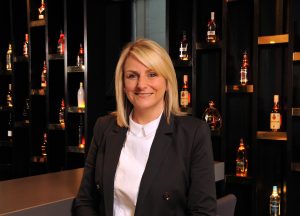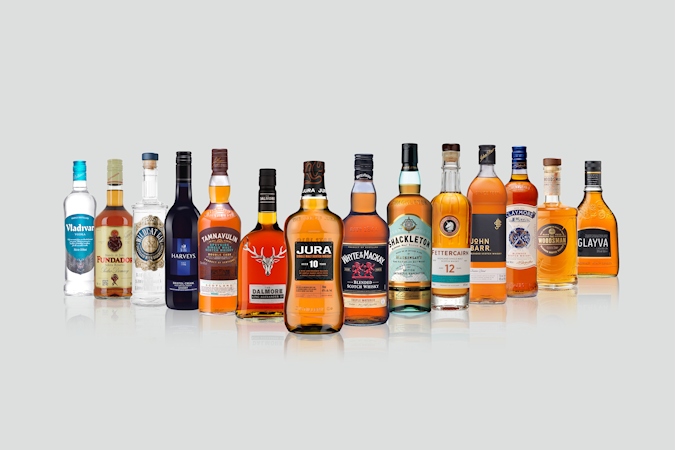Nick Garland, Whyte & Mackay’s chief commercial officer and Roslyn Lamont, head of on trade, tell Karen Peattie why the Scottish licensed trade is so important to the growth of the wider spirits industry – and why they support the SLTA
Changing consumer trends, fierce competition, tighter margins and an uncertain political climate continue to create challenges for the licensed trade. But the opportunities are there if you work in partnership with your customers, at the same time creating a point of difference over your competitors.

That’s the view of Whyte & Mackay’s Nick Garland and Ros Lamont – and when it comes to Scotland, they’re well aware that transparency and understanding are key to building relationships with time-pressed operators who can see the benefit of adopting a partnership approach and collaborating for mutual benefit.
“Having great brands helps but you still have to work hard to get your message across in a busy marketplace where you have bigger competitors with more brands and bigger budgets,” says Nick Garland, chief commercial director at Whyte & Mackay, the long-established Glasgow-based spirits business.
As brand owner of luminaries such as The Dalmore, Jura and Fettercairn single malts, Whyte & Mackay blended Scotch, Glayva liqueur and Vladivar vodka, the company is responsible for a weighty portfolio of long-established and popular brands. Last year, Whyte & Mackay made its first foray into the growing gin sector with Wildcat and in recent months has launched its 21.5% ABV spirit drink, Whyte & Mackay Light.
Inspired by the story of an 18th-century illicit gin merchant, Wildcat Gin joins the firm’s premium spirits portfolio and is gaining traction across the UK. “It’s in 400 outlets in Scotland and 600 nationally,” confirms Ros Lamont, head of on trade. “It’s not yet a year old but this is shaping up to be a cat with bite.”
Garland continues: “There are an enormous amount of gins on the market now so it’s a crowded space and creates a challenge for the on-trade – that’s why we’re taking a different approach with Wildcat.
“People used to drink gin to kick-start the change from day to evening, before switching to something else. We’re seeing that many consumers are now choosing to drink gin at other times, often staying with gin all evening. So we’ve developed a proposition that works just as well at the end of the evening as it does at the beginning.”
Meanwhile, Whyte & Mackay Light, which is almost half the minimum 40% ABV required for a spirit to be defined as a whisky, is an exciting newcomer launched in response to growing consumer demand for lower ABV drinks. Lamont explains: “We’re absolutely delighted with Whyte & Mackay Light. It took a long time to develop because we were aiming for a premium product that would stand out from the crowd.

“There’s a huge health agenda that we need to recognise and we were also aware of the fact that while people are drinking less, they want better quality – as Nick mentioned, we are seeing a different type of drinking occasion emerging as consumers change their habits.
“For us, it wasn’t a case of getting something onto the market quickly – we had to be happy with quality of the liquid. When people want to drink less or go for a lower ABV, it still has to taste fantastic and NPD has to meet stringent requirements when it comes to quality and taste.”
As Whyte & Mackay taps into its provenance and the compelling story behind its business and brands, it is always looking to the future – and that’s exactly what was behind its relocation three years ago, leaving Dalmore House in Glasgow’s St Vincent Street after 25 years for more modern offices in St Vincent Plaza, an 11-storey building just across the road.
“We’re passionate about our business and it was important to create a really high-quality working environment for staff and customers,” says Garland. “While we’re proud of Glasgow and our Scottish roots, we’re a global business and everything we do must reflect that.”
Global aspirations aside, Whyte & Mackay is very aware of its standing in the domestic market, Scotland in particular. “Scotland will always be very important to us,” says Lamont. “We’re passionate about Scotland and our customers appreciate that we will go the extra mile for them and reward their loyalty.
“Scottish operators are very switched on – from busy city-centre bars with a discerning clientele to long-established pubs in towns and villages across the country, hotels, restaurants, clubs: they’re all important to us and providing the excellent customer service that they expect and deserve is a priority for us.”
Lamont points to the growing band of entrepreneurial operators setting up shop, businesses that want to offer an experience for customers that will encourage repeat business. “It’s really encouraging for suppliers like us to see forward-thinking owners investing in the licensed trade,” she adds.
“These entrepreneurial operators are also fuelling wider interest in the licensed trade as a career option for people who would otherwise view a bar job as a means of earning money while at college or university, or a job with few prospects. Staff who are well trained and enjoy what they do add value to your business.”
Whyte & Mackay offers a full training support programme across its brands portfolio and will tailor that to individual businesses.
“We’re passionate about our brands and I think that north of the Border the licensed trade is very in tune with that,” suggests Garland. “It’s one of the reasons we support the SLTA – Scotland is important to our business and being involved with the leading trade association helps us understand the issues that concern its members who are also our customers.
“The SLTA supports the trade across a wide range of issues and it makes sense for us to be close to that.”

